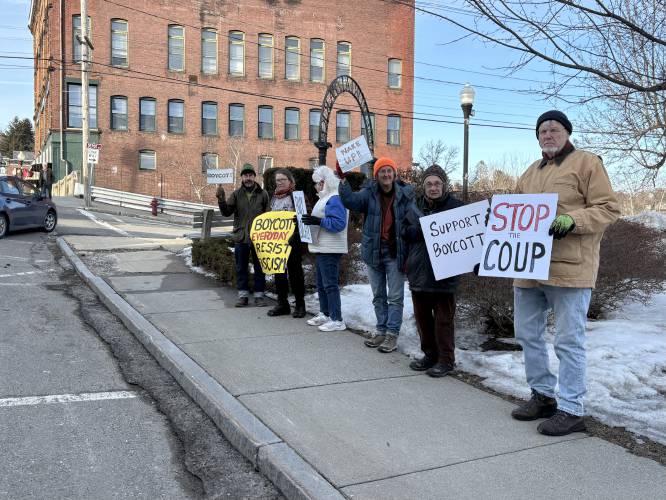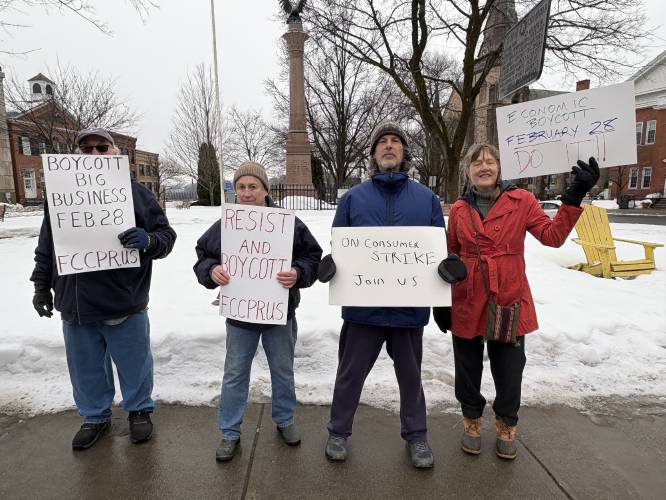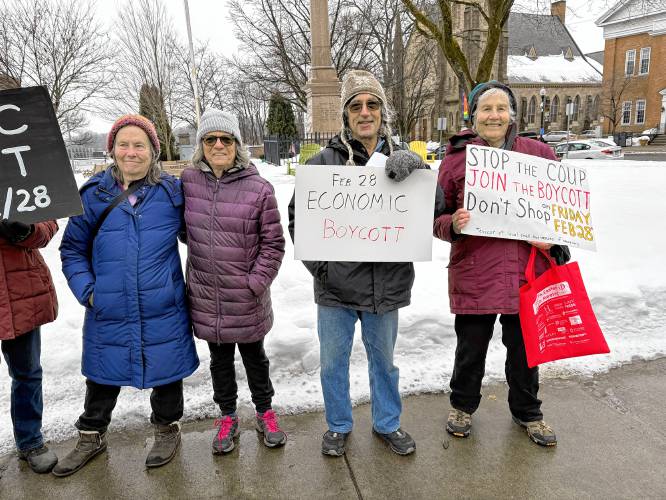Franklin County activists engage in ‘economic blackout’
|
Published: 03-04-2025 11:12 AM
Modified: 03-04-2025 11:13 AM |
GREENFIELD — Local political activists are calling for consumers to stop shopping at large corporations that are supporting Trump administration policies.
On Feb. 28, people across the country participated in a 24-hour economic blackout, refusing to shop at any large retailer and to only make purchases that are absolutely necessary such as food, and medicine, at small locally owned stores. Across Franklin County and the North Quabbin region protesters said they will continue to boycott businesses that support President Donald Trump.
“This is how we make history, we’re gonna show Trump and Musk that we have some economic power,” said David Greenburg of Colrain, who joined protesters with Franklin County Continuing the Political Revolution at the Greenfield Common on Thursday to publicize the boycott. “They’re totally taking apart the government.”
Greenburg said economic boycotts can have a large impact with minimal effort. If enough people simply do not shop it can have an impact on large businesses, and get a message across to the federal government that the public will not stand for unconstitutional reallocation of federal funding, tax breaks for billionaires, revocation of civil rights and diversity initiatives, and unelected private citizens such as Elon Musk influencing the government.
“It’s a very low bar. You basically just have to do nothing,” Greenburg said of the boycott.
Ann Ferguson of Leverett said if no action is taken, the Trump administration will continue to dismantle federal services and constitutional protections that millions of people rely on such as Medicaid and Social Security.
“It’s time to resist,” Ferguson said.
Ferguson said companies such as Target, Walmart, Lowe’s, Disney and Amazon have rolled back diversity, equity and inclusion initiatives in response to Trump policies, and that that these corporations, and the billionaires that run them, are influencing the administration, and are benefiting heavily from these policies at the expense of the American public.
Article continues after...
Yesterday's Most Read Articles
 Local ‘Hands Off!’ standouts planned as part of national effort
Local ‘Hands Off!’ standouts planned as part of national effort
 Incandescent Brewing now open in Bernardston
Incandescent Brewing now open in Bernardston
 Two arrested on drug trafficking charges in Greenfield
Two arrested on drug trafficking charges in Greenfield
 Berkshire DA says no crime occurred in student-officer relationship at Mohawk Trail
Berkshire DA says no crime occurred in student-officer relationship at Mohawk Trail
 Proposed ordinance would make Greenfield a ‘sanctuary city’ for trans, gender-diverse people
Proposed ordinance would make Greenfield a ‘sanctuary city’ for trans, gender-diverse people
 Sounds Local: A legend pays tribute to an icon: Seven-time Grammy-nominated Joan Osborne brings Bob Dylan repertoire to Shea Theater
Sounds Local: A legend pays tribute to an icon: Seven-time Grammy-nominated Joan Osborne brings Bob Dylan repertoire to Shea Theater
She added a day of not shopping should not have any detrimental impacts on small local businesses, but if enough people band together, they can stand against big corporations that support the Trump administration.
“This is a just a symbolic action that’s really targeted against the big corporations that are funding Trump and this illegal takeover,” Ferguson said. “It’s a symbolic action to show that we really care about defending our Constitution, defending our civil rights, and it’s our right to boycott,” she said.
“I know I didn’t elect that guy (Musk),” John Armstrong, of Orange, said.
In Orange, protesters noted the people behind many large corporations cover every industry and push small businesses to the side.
“These people have got their fingers in every pie,” Armstrong said.
For example, Armstrong said Amazon sells books, clothes, groceries, and just about anything you can think of. Amazon dominates online spaces making it difficult to find small online shops even if you want to shop at a small business.
While the Feb. 28 economic blackout called for shoppers to boycott Amazon, Forbes reported that the e-commerce giant actually saw a 1% increase in sales throughout the day.
Armstrong said in order to make a difference people need to buy less, and be more conscientious of where they shop.
Additional nationwide boycotts are being scheduled in the coming months, Armstrong said. A week-long Amazon boycott is set to begin on March 7, a week-long boycott of Nestle is set for March 21-28, a Walmart boycott from April 7-14, and another complete economic boycott on April 18.
Reach Madison Schofield at 413-930-4579 or mschofield@recorder.com










 Local libraries react to state funding cuts, federal administrative leave
Local libraries react to state funding cuts, federal administrative leave Colrain zoning board approves variance for Call Road cell tower
Colrain zoning board approves variance for Call Road cell tower Cooking up an expansion: Cocina Lupita eyes second location in Turners Falls
Cooking up an expansion: Cocina Lupita eyes second location in Turners Falls Greenfield High School brings back full-length productions with ‘Robin Hood’
Greenfield High School brings back full-length productions with ‘Robin Hood’
